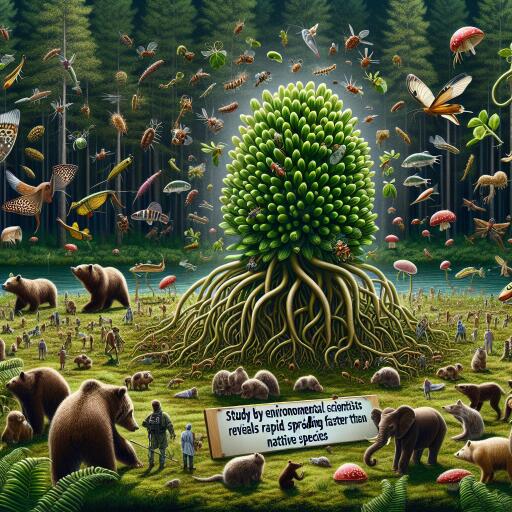
Alarming Expansion of Non-Native Species Outpaces Natives, Poses Biodiversity Threat
In an era where biodiversity is under unprecedented threat, a revealing study spearheaded by the University of Massachusetts Amherst has illuminated a concerning trend: non-native species are infiltrating new territories up to 100 times faster than their native counterparts. This surge, significantly propelled by human activities, is casting shadows on the survival of native biodiversity, particularly with the looming challenges posed by climate change.
The comprehensive study, a collaborative effort involving international researchers, delves into the velocity at which native and non-native species are relocating. This swift advance of non-native species underscores an immediate need for strategies to curb their impact on ecosystems.
“The exponential rise in invasive plant species globally is alarming, compounded by the role of plant nurseries in accelerating their spread due to climate change. Our primary aim was to understand the current mobility of species and project their future displacements,” commented Bethany Bradley, a leading environmental conservation professor. The investigation shed light on the pace at which species are expected to migrate to adapt to climate variations: land-based species approximately 3.25 kilometers annually, and marine species about 2.75 kilometers.
In a stark revelation, the study shows that native species are lagging, with an average annual movement of merely 1.74 kilometers. On the other hand, non-native species are stretching their domains by roughly 35 kilometers each year, and with human intervention, this number soars to an astonishing 1,883 kilometers annually – showcasing a yawning gap in the adaptability and expansion of native versus non-native species.
“The findings punctuate the inability of native species to cope with rapidly changing ecosystems without human intervention,” Bradley added. Furthermore, the research explored the potential of native and non-native species to find suitable habitats in new climates. Although limited by fewer case studies, projections suggest non-native species might find more favorable conditions in warmer climates, extending their territory even further.
This study casts a spotlight on human involvement in the distribution of species, whether intentional or accidental. Highlighting the influence of global trade and horticulture in facilitating the spread of non-native species, Bradley calls for a strategic approach to conservation, including assisted migration to help native species relocate to more favorable environments. “Our adeptness at relocating species stands out as a major leverage non-native species have. To give our native flora and fauna a fighting chance, assisted migration must be seriously considered and implemented,” she stressed.
The findings of this pioneering study are a wakeup call for immediate and strategic actions to safeguard native biodiversity. By recognizing the intertwined threats of invasive species and climate change, it emphasizes the need for conservation efforts that bolster native populations through assisted migration and enforce stricter regulations against the proliferation of non-native species. Ensuring the resilience of biodiversity in the face of these dual challenges is paramount to preserving the delicate balance of ecosystems worldwide.





Leave a Reply